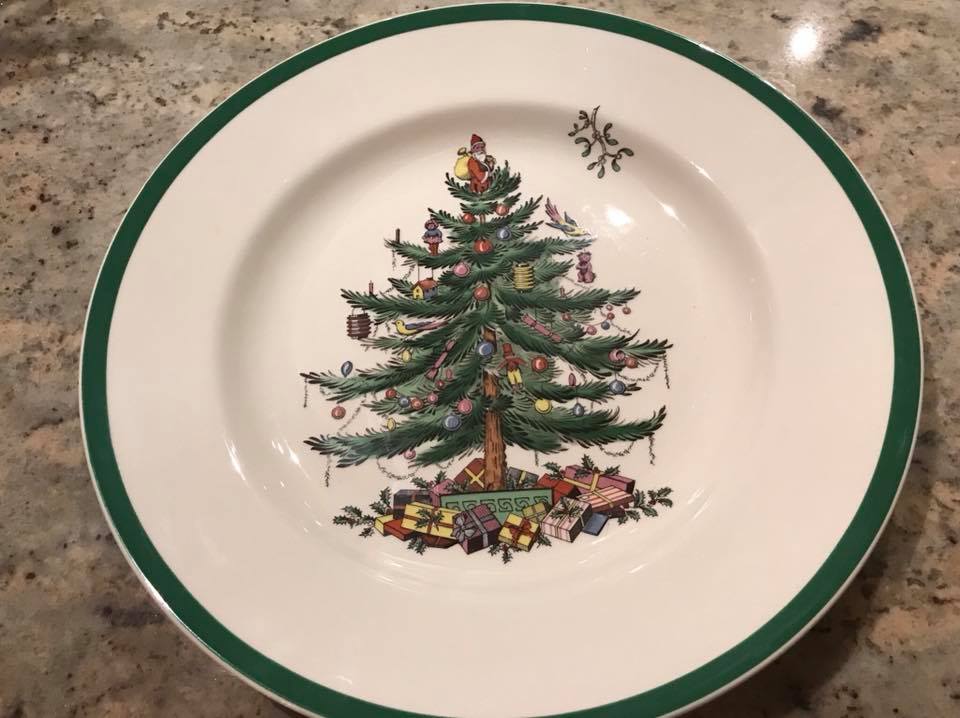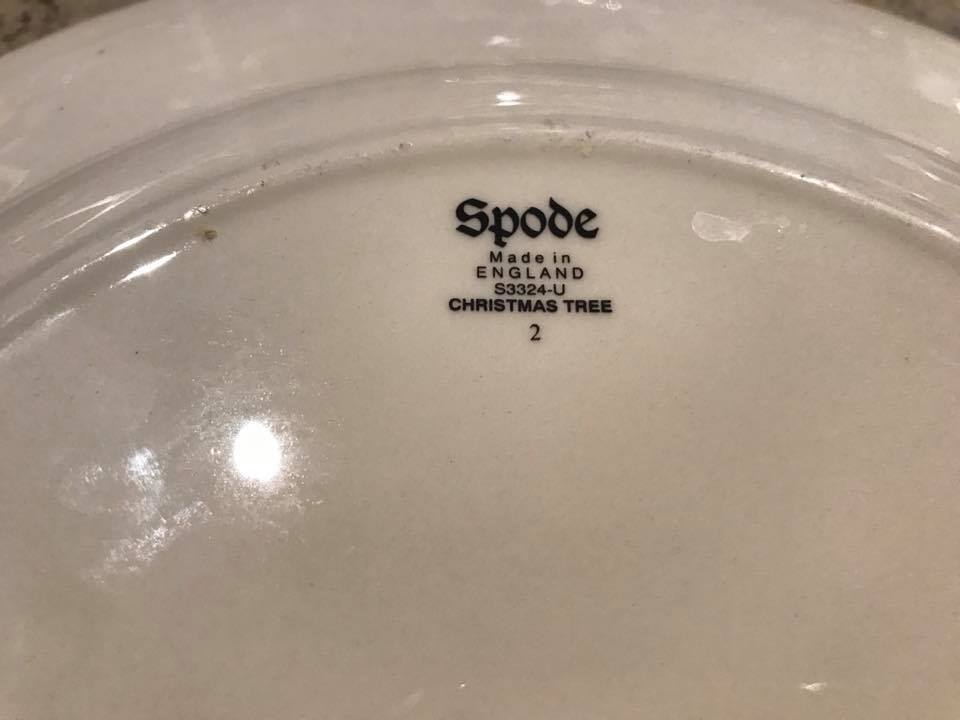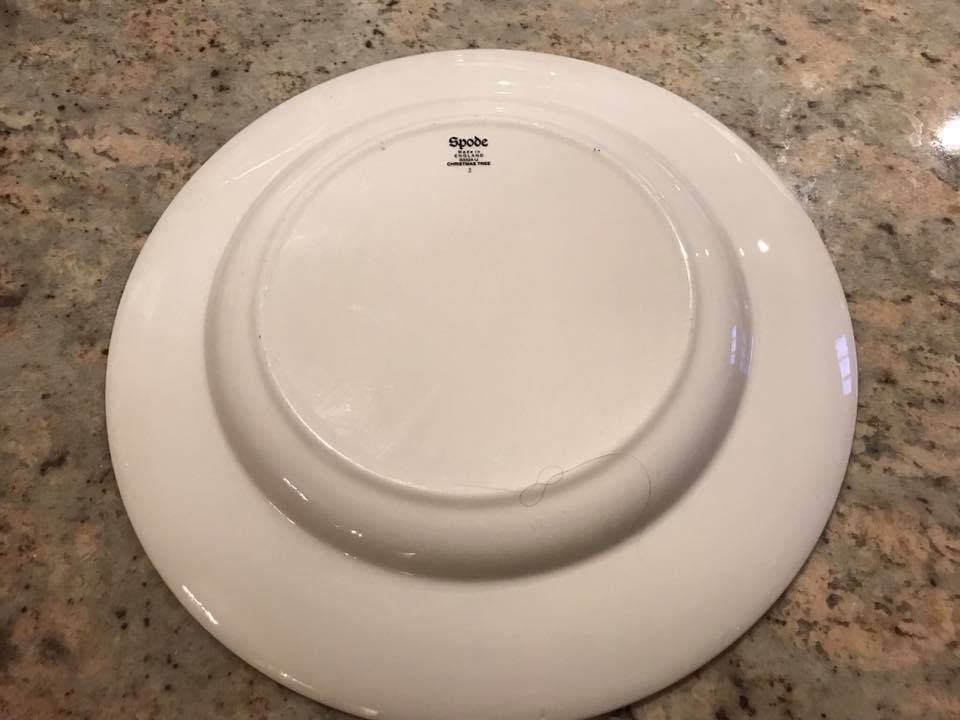Vintage Spode Christmas Tree Plate, Made In England: 71,900 ppm Lead [90 ppm Lead is unsafe for kids.]
For those new to this website:
Tamara Rubin is a multiple-federal-award-winning independent advocate for childhood Lead poisoning prevention and consumer goods safety, and a documentary filmmaker. She is also a mother of Lead-poisoned children (two of her sons were acutely Lead-poisoned in 2005). Since 2009, Tamara has been using XRF technology (a scientific method used by the U.S. Consumer Product Safety Commission) to test consumer goods for toxicants (specifically heavy metals — including Lead, Cadmium, Mercury, Antimony, and Arsenic). Tamara’s work was featured in Consumer Reports Magazine in February of 2023 (March 2023 print edition).
Published: June 14, 2018
Updated: December 19, 2020
This is an ad-free article.
This Spode china (decorated with a Christmas tree for the holidays) had the following readings when tested with an XRF instrument (which tests down to single digit parts per million).
Glaze on the food surface of the dish:
- Lead (Pb): 71,900 +/- 3,500 ppm
- Cadmium (Cd): Non-Detect (ND / negative)
- Mercury (Hg): Non-Detect (ND / negative)
- Arsenic (As): Non-Detect (ND / negative)
How much Lead is too much Lead?
…including some “Fun Facts”:
- Newly-manufactured items (made today) are considered unsafe for children to use if they are finished with any paint, glaze or coating that is 90 ppm Lead or higher.
- Substrates that test positive for 100 ppm Lead (or higher) are considered unsafe for children.
- There is currently no regulatory standard setting limits for Lead in paint or glaze on modern consumer goods intended for use by adults.
- Dishes are generally not considered to be “items intended for use by children” (even if they have fun decorative patterns that would obviously be attractive to children – like Christmas trees!) and, as such, new dishes manufactured today may still be made with high-Lead decorative coatings (including glazes / decals / painted markings.)
- For context: When Lead-based paint was banned in 1978, the requirement was that paint for residential use applications only (paint for houses, applied in areas that could be reached by children) must henceforth contain less than 600 ppm Lead.
- The allowable level of Lead in house paint was subsequently lowered, and today modern house paint must (like modern consumer goods for kids) also be below 90 ppm Lead [and most house paints now usually test completely negative for Lead].
- Federal funds are currently allocated for interventions in pre-1978 housing (for low income families) when the paint is positive for Lead at a level of one milligram per square centimeter [eoughly equivalent to an XRF instrument reading of 5,000 ppm Lead].
- The dish pictured here has Leaded glaze (on the food surface!) with levels of Lead that – at over 70,000 ppm – far exceed the standards above under which the feds would consider it unsafe in housing (if it were house paint – and not glaze on a dinner plate.)
- Because it is a dinner plate, and because dinner plates are not considered to be items intended for use by kids (even if it were made recently and not specifically manufactured as a dish for kids) – it is considered perfectly legal and safe.
- It takes a microscopic amount of Lead to poison a human being.
- All federal agencies agree that there is no safe level of Lead exposure.
- Glaze often wears off of the surfaces of dishes (especially with regular use and washing – either by hand or in the dishwasher.)
Takeaway:
Given all of the above, I personally would never choose Spode china for my family, regardless of the year of manufacture (I have tested high-Lead examples from this brand with confirmed dates of manufacture as late as 2002 – which is just 18 years ago at this point, and I don’t yet know when they stopped using high Lead glazes.) Given it just takes a microscopic amount of Lead to poison a child (or any human for that matter) I think that even using a dish like this “just once” is not worth the risk – especially given there are Lead-free options out there.
Some additional reading that may be of interest
- To learn more about XRF testing, Click Here.
- To learn more about the concern for Lead in dishes, Click Here.
- Not sure what to do with your Leaded Spode dishes? Should you throw them out? Should you sell them? Here’s a post I wrote with some considerations and options.
- Click here to see more examples of Spode china that I have tested! Nearly all vintage Spode (and even some of the new Spode) that I have tested has been positive for Lead.
- Here’s a Lead-free alternative for your holiday table. These are the dishes we use every day in our home. [Link]
As always, please let me know if you have any questions. I will do my best to answer them personally as soon as I have a moment. Thank you for reading and for sharing articles from LeadSafeMama.com / TamaraRubin.com.
Never Miss an Important Article Again!
Join our Email List












Do the ones made in early 2000s have lead?
They can, yes.
Hi, I recently found a set of dishes I’ve been looking for for years. Then I saw your page for the first time. What a wonderful thing to find ‼️I have so much pyrex that I love, now it will be to look at!!
The set I found, I can’t find on your site. It is Thomson, Smith and Thomson “Boutenier” as in the thing guys wear! Does this have a lead and cadmium rating??
Is there an easy way that I can test stuff for myself and others?
Thank you for all you do to help people be healthy. I enjoyed your travel photos ❣️
So I just came from a party and ate off this exact plate. I’m wondering how much exposure I’d get from a single meal on a plate that 7% lead. Ugh.
So glad you tested these. Do you know which parts have the lead? Is it a certain paint color or all over? Thank you.
I stumbled across your page. I probably have 300 pieces of Spode. Dinnerware, glasses, bakeware. Serving dishes. Even silverware and linens. Even salt and pepper shakers. It was gifted to me over a period of 20 years from my mother.
I’m going to continue researching this information but I feel confident these will be come “display only” pieces. To me, those appear to be astronomical readings? I wish there was more attention on this, thank you for sharing.
These are astronomical readings. They are definitely not safe for use with food. I’m so happy you found this work and decided to make them decorative pieces!
You may want to read this (about the potential symptomatic expression of Lead exposure in adults):
https://tamararubin.com/2017/01/what-is-the-impact-of-lead-poisoning-in-adults-including-college-age-students/
Tamara
I got my set in 1998. Do I have to worry about these having lead. I only use them once a year at Christmas time.
Have u tested the Christmas rose made by Spode, made in England in 1980 i think. It looks like a gold trim all around the edges. I just bought a set of 4 at Goodwill and wanted to use these for Christmas. I don’t see these on here.
You tested my Spode Christmas Tree from the late 90’s or early 2000’s. It showed high lead levels as well as other toxic metals. With the same pattern manufactured no later than 2021 would it be safe?
Thank you for this! Not buying these plates at an estate sale now.